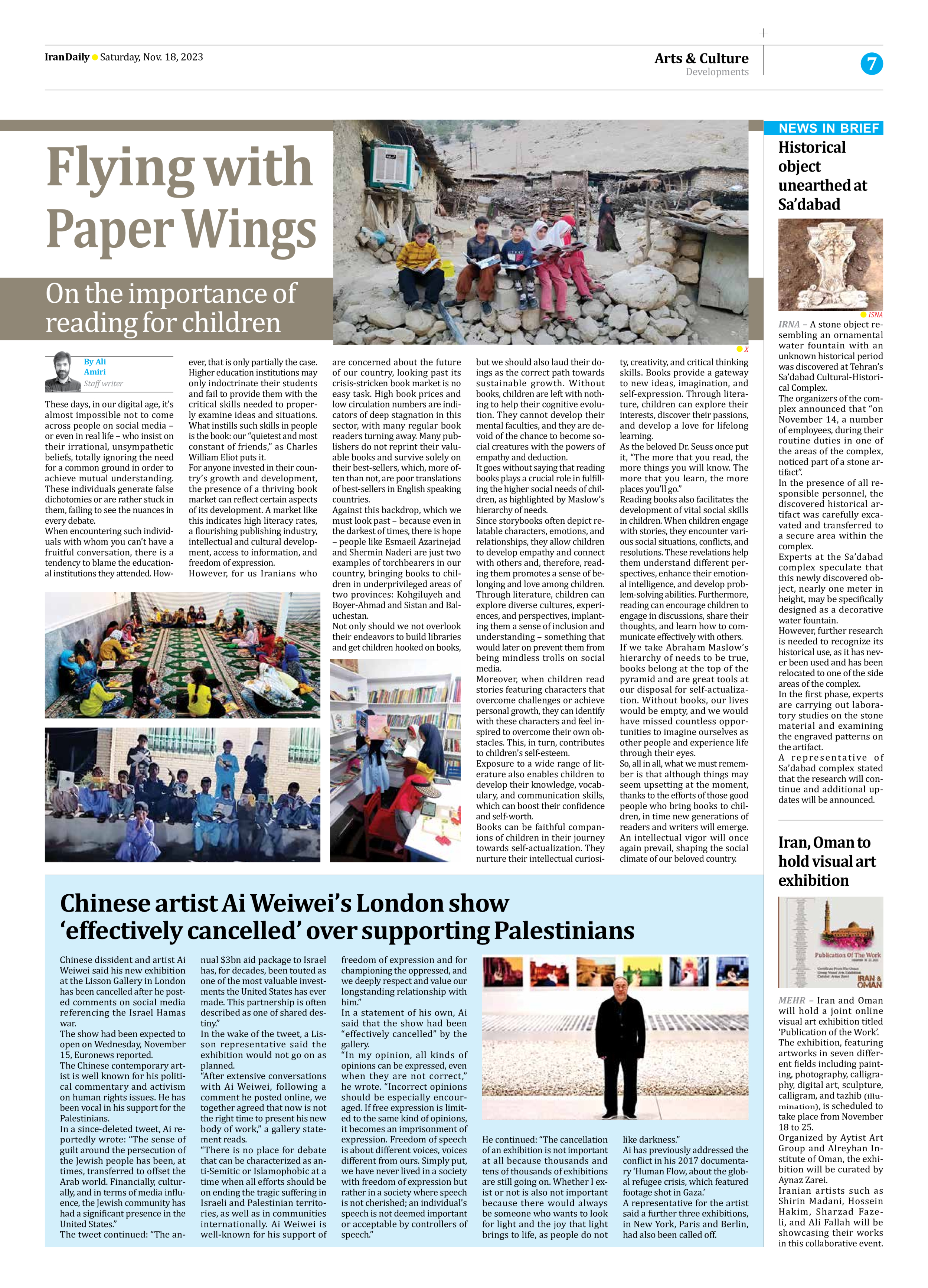
Flying with Paper Wings
On the importance of reading for children
By Ali Amiri
Staff writer
These days, in our digital age, it’s almost impossible not to come across people on social media – or even in real life – who insist on their irrational, unsympathetic beliefs, totally ignoring the need for a common ground in order to achieve mutual understanding. These individuals generate false dichotomies or are rather stuck in them, failing to see the nuances in every debate.
When encountering such individuals with whom you can’t have a fruitful conversation, there is a tendency to blame the educational institutions they attended. However, that is only partially the case. Higher education institutions may only indoctrinate their students and fail to provide them with the critical skills needed to properly examine ideas and situations. What instills such skills in people is the book: our “quietest and most constant of friends,” as Charles William Eliot puts it.
For anyone invested in their country’s growth and development, the presence of a thriving book market can reflect certain aspects of its development. A market like this indicates high literacy rates, a flourishing publishing industry, intellectual and cultural development, access to information, and freedom of expression.
However, for us Iranians who are concerned about the future of our country, looking past its crisis-stricken book market is no easy task. High book prices and low circulation numbers are indicators of deep stagnation in this sector, with many regular book readers turning away. Many publishers do not reprint their valuable books and survive solely on their best-sellers, which, more often than not, are poor translations of best-sellers in English speaking countries.
Against this backdrop, which we must look past – because even in the darkest of times, there is hope – people like Esmaeil Azarinejad and Shermin Naderi are just two examples of torchbearers in our country, bringing books to children in underprivileged areas of two provinces: Kohgiluyeh and Boyer-Ahmad and Sistan and Baluchestan.
Not only should we not overlook their endeavors to build libraries and get children hooked on books, but we should also laud their doings as the correct path towards sustainable growth. Without books, children are left with nothing to help their cognitive evolution. They cannot develop their mental faculties, and they are devoid of the chance to become social creatures with the powers of empathy and deduction.
It goes without saying that reading books plays a crucial role in fulfilling the higher social needs of children, as highlighted by Maslow’s hierarchy of needs.
Since storybooks often depict relatable characters, emotions, and relationships, they allow children to develop empathy and connect with others and, therefore, reading them promotes a sense of belonging and love among children. Through literature, children can explore diverse cultures, experiences, and perspectives, implanting them a sense of inclusion and understanding – something that would later on prevent them from being mindless trolls on social media.
Moreover, when children read stories featuring characters that overcome challenges or achieve personal growth, they can identify with these characters and feel inspired to overcome their own obstacles. This, in turn, contributes to children’s self-esteem.
Exposure to a wide range of literature also enables children to develop their knowledge, vocabulary, and communication skills, which can boost their confidence and self-worth.
Books can be faithful companions of children in their journey towards self-actualization. They nurture their intellectual curiosity, creativity, and critical thinking skills. Books provide a gateway to new ideas, imagination, and self-expression. Through literature, children can explore their interests, discover their passions, and develop a love for lifelong learning.
As the beloved Dr. Seuss once put it, “The more that you read, the more things you will know. The more that you learn, the more places you’ll go.”
Reading books also facilitates the development of vital social skills in children. When children engage with stories, they encounter various social situations, conflicts, and resolutions. These revelations help them understand different perspectives, enhance their emotional intelligence, and develop problem-solving abilities. Furthermore, reading can encourage children to engage in discussions, share their thoughts, and learn how to communicate effectively with others.
If we take Abraham Maslow’s hierarchy of needs to be true, books belong at the top of the pyramid and are great tools at our disposal for self-actualization. Without books, our lives would be empty, and we would have missed countless opportunities to imagine ourselves as other people and experience life through their eyes.
So, all in all, what we must remember is that although things may seem upsetting at the moment, thanks to the efforts of those good people who bring books to children, in time new generations of readers and writers will emerge. An intellectual vigor will once again prevail, shaping the social climate of our beloved country.







